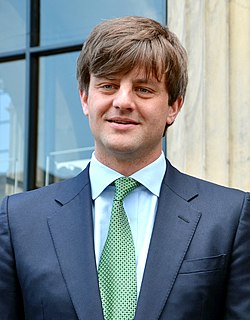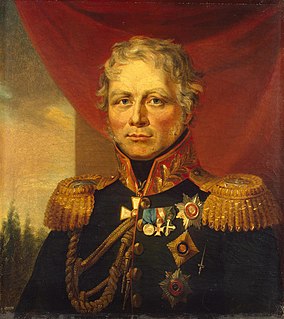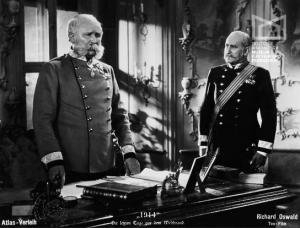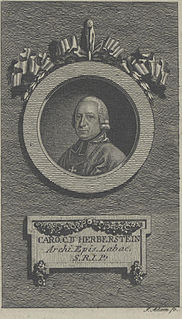
Ferdinand Ernst Karl count of Herberstein (died 1720) was a German mathematician and a military officer. [1]

Ferdinand Ernst Karl count of Herberstein (died 1720) was a German mathematician and a military officer. [1]
Son of Karl Sigmund, he lived in Bohemia. He wrote several books about mathematics and geometry. Some of the books are signed using the pseudonym of "Amari de Lapide". [2]

Solms-Braunfels was a County and later Principality with Imperial immediacy in what is today the federal Land of Hesse in Germany.

Fürstenberg is the name of a Swabian noble house in Germany, based primarily in what is today southern Baden-Württemberg near the source of the Danube river.

Ernst August, Hereditary Prince of Hanover is the eldest child of Ernst August, Prince of Hanover, and his former wife Chantal Hochuli.

Count Friedrich August von Harrach-Rohrau,, was plenipotentiary minister of the Austrian Netherlands (1732–1741) and became Governor-General ad interim in 1741–1744.
Christian Otto von Limburg Stirum, count of Limburg Bronkhorst and Stirum (1694–1749), was a member of the House of Limburg-Stirum and the third reigning monarch from the branch of Limburg-Styrum-Styrum.

Ernest Frederick, Duke of Saxe-Coburg-Saalfeld, was a Duke of Saxe-Coburg-Saalfeld.

Ferdinand Karl Friedrich Freiherr von Wintzingerode was a German nobleman and officer in several different armies of the Napoleonic Wars, finally ending up as a general in the Imperial Russian Army and fighting in the War of the Sixth Coalition against the French invasion of Russia and the subsequent campaigns in Germany and France. He appears in Tolstoy's War and Peace.
Prince Johann Ferdinand of Auersperg was the second Prince of Auersperg and Duke of Silesia-Münsterberg from 1677 until his death.

The Eleven Schill Officers is a 1932 German historical film directed by Rudolf Meinert and starring Friedrich Kayßler, Hertha Thiele, and Heinz Klingenberg. It was a remake of a 1926 silent film of the same name which had also been directed by Meinert. The film depicts the failed 1809 uprising of Prussian soldiers led by Ferdinand von Schill against the occupying French. It focuses in particular on eleven of Schill's officers who were executed by the French at Wesel. The film was a Prussian film, part of a wider trend of German historical films made during the Weimar Era and set in the Napoleonic Era.

Archduke Ernst of Austria, Archduke of Austria, Prince Royal of Hungary and Bohemia was a member of the House of Habsburg-Lorraine.

1914 is a 1931 German drama film directed by Richard Oswald and starring Albert Bassermann, Hermann Wlach and Wolfgang von Schwindt. The film focuses on the leadership of the Great Powers of Europe in the days leading up to the outbreak of the First World War, culminating in the assassination of Archduke Franz Ferdinand of Austria by Gavrilo Princip. It was shot at the Babelsberg Studios in Berlin and premiered in the city at the Tauentzien-Palast on 20 January 1931. At the request of the German Foreign Office an introduction by Eugen Fischer-Baling was filmed and presented at the start of the film. A special screening was held at the Reichstag on 3 March 1931.

Karl Ferdinand Ranke was a German educator and classical philologist. He was the brother of historian Leopold von Ranke (1795–1886) and theologians Friedrich Heinrich Ranke (1798–1876) and Ernst Constantin Ranke (1815–1888).
The Bull of Olivera is a 1921 German silent historical drama film directed by Erich Schönfelder and starring Emil Jannings.

Johann Karl von Herberstein was a bishop of Ljubljana.

Große Berliner Kunstausstellung , abbreviated GroBeKa or GBK, was an annual art exhibition that existed from 1893 to 1969 with intermittent breaks. In 1917 and 1918, during World War I, it was not held in Berlin but in Düsseldorf. In 1919 and 1920, it operated under the name Kunstausstellung Berlin. From 1970 to 1995, the Freie Berliner Kunstausstellung was held annually in its place.